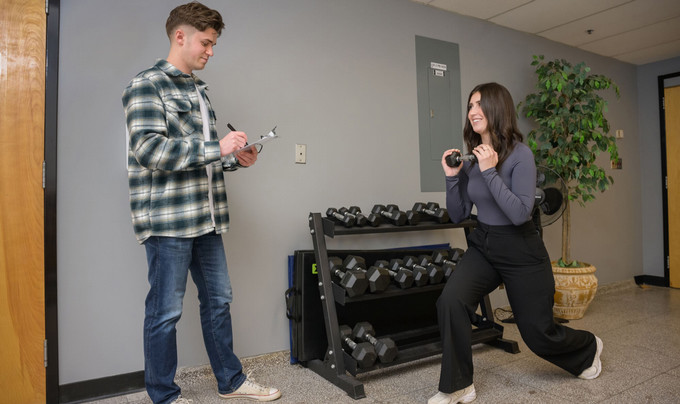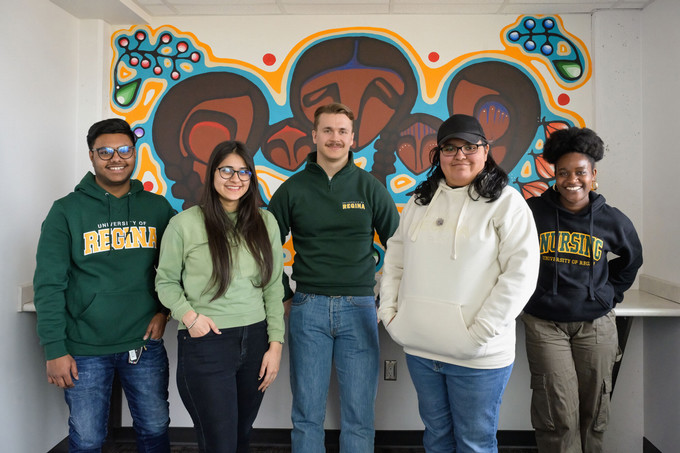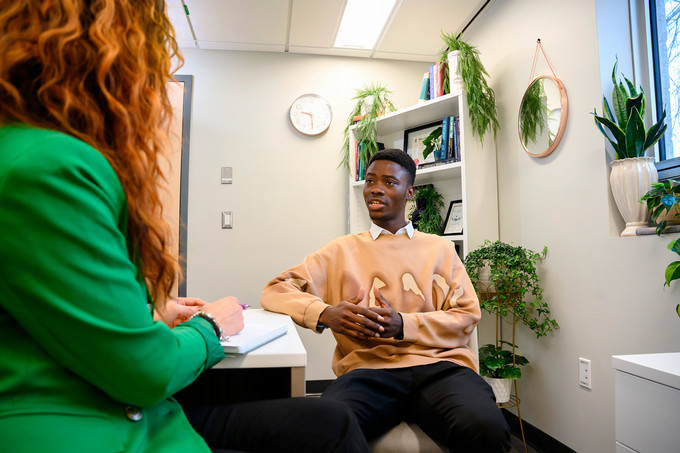
Well-being and Belonging
Strengthen Connections With Ourselves
We recognize the importance of well-being and belonging to the success of our students, faculty, staff, and community. The University of Regina is committed to creating space where everyone feels part of the community. We embrace the ideals of the medicine wheel that describes the need for us to have balance on our journey of emotional, physical, mental, and spiritual well-being. We foster the success of our students, faculty, and staff by valuing their health, safety, and well-being.
Goal: Assess, adopt, implement, and improve student thriving metrics. 3
3 Adopt and implement student thriving metrics through experience surveys. These metrics should include measurements of sense of community, purpose, and belonging; adequacy of supports; and evaluation of equity, diversity, and inclusion initiatives.
The Strategic Plan takes a holistic approach and highlights the importance of belonging and the many facets of well-being to the success of students, staff, and faculty. Current and planned initiatives supporting well-being and belonging include:
- The EDI-AO Action Plan. Equity, Diversity, Inclusion and Anti-oppression embodies honouring who we are, where we are, where we have been, and where we are going. The EDI-AO Action Plan establishes the foundation for shaping the institutional culture to one that integrates EDI considerations into decision making, teaching, research, and learning. Effective EDI requires openness and acknowledgment of the lived experiences of students, faculty, staff, and our greater community
- Venues such as the Centre for Health, Wellness & Performance, which extends our impact beyond the University and into communities throughout Saskatchewan
- The first nurse practitioner-led Student Wellness Centre at a Canadian university, opened in October 2021 to provide primary health-care services to U of R students
- A Mental Wellness Hub launched in September 2020, which plays a pivotal role in achieving our objectives of providing internal and external resources for the education, training, and mental health literacy for our students, faculty, and staff. The Hub is one part of the University’s overarching Mental Health Strategy and is designed to educate, inform, and foster collaboration of mental well-being initiatives, services, and resources
- A commitment to prioritizing and supporting mental health research to improve the lives of people in Saskatchewan and throughout the country. This work includes the Online Therapy Unit and institutes such as the Canadian Institute for Public Safety Research and Treatment and the Child Trauma Research Centre, making the University a national leader in mental health literacy and innovation, and creating a strong healthy workforce and communities
Equity, Diversity, and Inclusion (EDI)
Our community is strengthened by its diverse worldviews and perspectives. The University of Regina is committed to cultivating an equitable, diverse, and inclusive environment. By creating awareness of how worldviews shape attitudes and perspectives, we are all strengthened.
Objective Goals
- Review and renew policies to ensure the use of inclusive language
- Provide opportunities for students, faculty, and staff to develop skills enabling effective interactions with people across cultures
- Develop comprehensive recruitment and retention plans for achieving and sustaining parity of underrepresented groups on campus
- Refine the diversity reporting framework
- Identify LGBTQ2S+ as an underrepresented group
- Provide EDI-specific training and workshops
- Engage faculty and staff in EDI outreach initiatives

Healthy Living
Our current health care systems in Saskatchewan and Canada face a crucial challenge to balance the demands of a growing population with available resources. We must make the connections between our everyday activities and our physical well-being, and take responsibility for those components of our health that are within our control. To this end, the University of Regina is committed to the provision and encouragement of safe and healthy lifestyles.
Objective Goals
- Support and prioritize research activities at existing health-related research centres on campus
- Identify and address barriers to fitness and wellness adoption, promoting a healthier campus community
- Work continuously to improve the affordability of campus life by providing affordable and high-quality food and evaluating other costs for students, faculty, and staff
- Educate and provide opportunities to learn new skills around healthy living
- Prioritize infrastructure projects that provide opportunities to improve food services on campus for healthier and culturally specific food options and offerings after regular hours
- Support and promote a Student Wellness Centre

Mental Health Literacy and Research
Mental health disabilities are anticipated to surpass physical disabilities in Canada by 2025, a crisis that needs urgent and sustained attention and support. The University of Regina is a national leader in mental health research, which improves the lives of individuals in our communities. The University is also at the leading edge of mental health literacy and is developing a coordinated approach to a primary health care model of mental health. This includes the provision of varied supports and resources, early intervention, and counselling, which are key for building resiliency and reducing stigma, thus supporting the long-term mental health of our stakeholders.
Objective Goals
- Develop and implement a robust mental health website/hub
- Prioritize and support research in mental health
- Strengthen and support actions for mental health literacy and a comprehensive mental health strategy
- Commit to consistent funding for the coordination of mental health resources
- Develop and monitor metrics necessary to measure mental health literacy on- and off-campus
